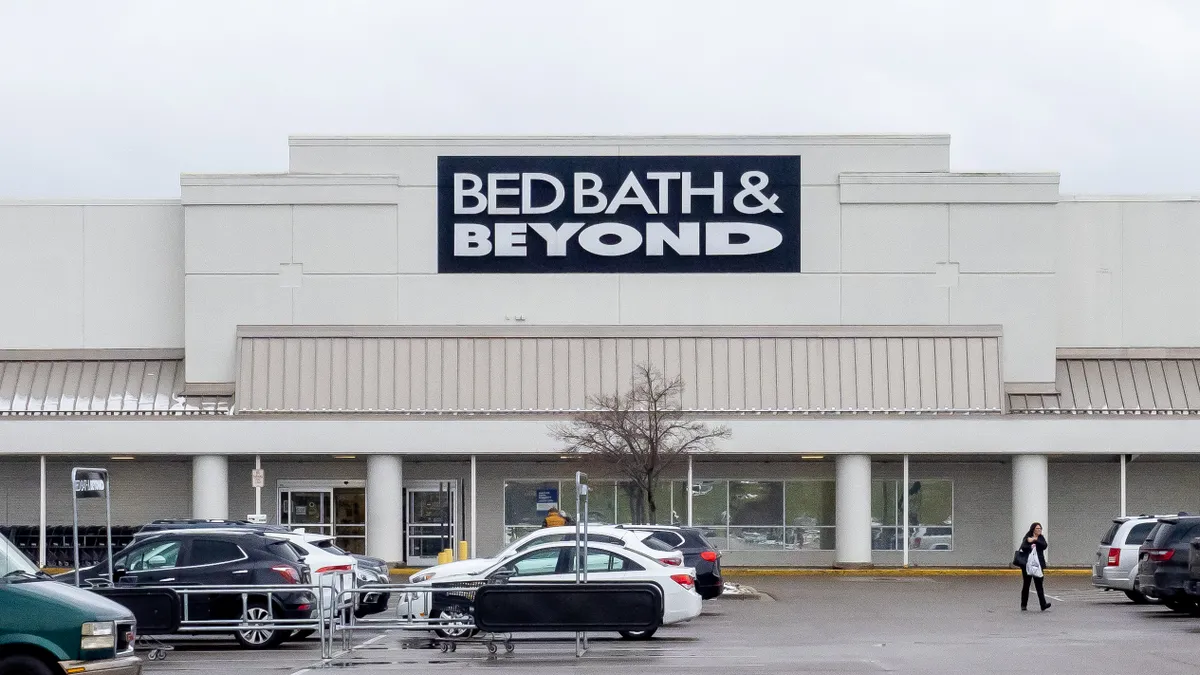Few observers were surprised this week when Bed Bath & Beyond filed for bankruptcy because the struggling retailer had warned it might more than once. Moreover, no buyer — not any of the 60 or so would-be suitors the company said it’s met with since last year — has stepped up to take it over. That means the process is most likely to end with it disappearing from the landscape. The company has already begun its wind-down.
That has implications for other retailers, including rivals selling similar merchandise and stores interested in its leases. The years-long decline at Bed Bath & Beyond accelerated in recent years, hit by the pandemic and its own missteps. Still, although its Q4 net sales plunged nearly 50% year over year, they still topped a billion dollars. That’s now up for grabs.
“Overall, I don’t see any one retailer gaining that much additional income given the number that are competing in the same space,” Kantar Senior Vice President Dave Marcotte said by email. “If I was going to lean into one vs. the other it would be Kohl’s (the same approach to promotions with same product groups), and At Home, which has 250 superstores in most of the same markets. They are basically Bed Bath & Beyond in a 100,000sqft+ box, though without the same assortment of electronics.”
Walmart, Target and Amazon, all with stronger online options, were already taking share from Bed Bath & Beyond. Several analysts, including those at GlobalData, Bank of America and Euromonitor, joined Marcotte in noting that Walmart, Target and off-price players — particularly TJX’s HomeGoods — stand to gain further as the retailer collapses. Off-pricer Ross “has to be mentioned since they cover the same space and clientele,” and Best Buy will likely pick up appliance sales, Marcotte said.
“The remaining share Bed Bath and Beyond has will be spread quite thinly,” GlobalData Managing Director Neil Saunders said in emailed comments. “As for properties, because Bed Bath & Beyond is in some reasonable locations, we believe landlords have already lined up potential new tenants for the spaces.”
Marcotte is less sure about Amazon, however.
“Amazon is obvious, until you see the Bed Bath & Beyond shopper as being more in-store bargain hunters,” he said. “So maybe not.”
In a client note Monday, Bank of America analysts led by Curtis Nagle said they expect Bed Bath & Beyond’s sales “to be relatively widely dispersed to the largest competitors in the market,” which include Walmart, Amazon, Target, Wayfair and Williams-Sonoma, and similarly see brick-and-mortar to benefit the most, given that 75% of the segment’s sales are rung up in stores.
“However, we believe that Wayfair and Overstock could see a degree of revenue upside from the Bed Bath bankruptcy,” Nagle said, noting Wayfair and Overstock executives themselves have said that the retailer’s vendors have shifted to their platforms. Overstock CEO Jonathan Johnson last month told sibling publication Supply Chain Dive that the e-retailer has been proactive in pursuing some of those suppliers.
“When the consumer is thinking about where to get the type of home goods and home furnishings products that are Bed Bath & Beyond’s stock in trade, the first place that is coming to mind now, for where they can fill that gap, is Target."

Bob Hoyler
Analyst, Euromonitor
At Wayfair, for every 5% of Bed Bath & Beyond revenue (not including BuyBuy Baby), revenue could increase 2%, with high adjusted EBITDA flow-through of low-to-mid tens of millions of dollars, according to Bank of America research. At Overstock, for every 1% of Bed Bath revenue, revenues could increase 3% and its adjusted EBTIDA could increase by about $10 million or nearly a percentage point.
Players like RH or Arhaus won’t pick up much because their focus is furniture, which wasn’t a large business for Bed Bath & Beyond, and their customer base is more affluent, according to Bank of America. Yet, while Ikea is more budget-oriented and offers much the same assortment, its U.S. expansion is unlikely to occur fast enough to benefit, according to Marcotte.
Target is poised to gain the most, according to Euromonitor analyst Bob Hoyler.
“When the consumer is thinking about where to get the type of home goods and home furnishings products that are Bed Bath & Beyond’s stock in trade, the first place that is coming to mind now, for where they can fill that gap, is Target,” he said. “Target is very strong in a lot of those same categories, and they've done a great job, not only bringing in brands, but also with their own private label portfolio in those categories.”
Bed Bath & Beyond was probably well aware of Target’s appeal to its own customers when it brought in former Target chief merchant Mark Tritton as CEO in 2019, according to Hoyler. Tritton had overseen a successful escalation of Target’s multi billion-dollar private-label strategy. Bed Bath & Beyond’s effort was ill timed because of existing, pandemic-related supply chain disruptions, he said. But its customers also weren’t ready for private labels — at least not from Bed Bath & Beyond.
“The decision about shifting to more private label or store brand goods was made to more or less emulate Target,” Hoyler said. “Many loyal customers of Bed Bath and Beyond who were unable to find the products they previously trusted turned to Target because that was probably the next best option. And if you look at the demographic profile of a lot of their customer base, there's a lot of overlap there.”
The retailers unlikely to see much of a windfall from Bed Bath & Beyond’s exit are department stores — the very segment that Bed Bath & Beyond first challenged a half century ago as a “category killer,” according to Hoyler.
“Macy's may be able to pick up a little bit of that slack,” he said. “After a little bit of a reprieve in 2021, when we saw a big rebound in department store sales, we’ve seen department stores return to their secular decline in 2022. I was thinking maybe Kohl's, but I don't think they will. Kohl’s is in a lot of trouble right now. Traditionally, the types of stores that we might expect to do well are the department store brands, but I don't think that's where the long-term victory is. I think that's mostly going to be Target.”





















